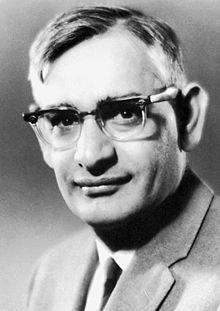
Back هار غوبند خورانا Arabic هار جوبند خورانا ARZ हरगोविन्द खुराना AWA هار گوبیند کورانا AZB Хар Гобінд Карана Byelorussian হর গোবিন্দ খোরানা Bengali/Bangla Har Gobind Khorana Catalan ھار گۆبید خورانا CKB Har Gobind Khorana Czech Har Gobind Khorana Danish
Har Gobind Khorana | |
|---|---|
 | |
| Born | 9 January 1922 |
| Died | 9 November 2011 (aged 89) Concord, Massachusetts, U.S. |
| Citizenship | United States |
| Alma mater | |
| Known for | First to demonstrate the role of nucleotides in protein synthesis |
| Spouse | Esther Elizabeth Sibler |
| Awards | |
| Scientific career | |
| Fields | Molecular biology |
| Institutions |
|
| Doctoral advisor | Roger J.S. Beer |
| Doctoral students | Shiladitya DasSarma |
| Signature | |
 | |
Har Gobind Khorana (9 January 1922 – 9 November 2011) was an Indian-American biochemist.[1] While on the faculty of the University of Wisconsin–Madison, he shared the 1968 Nobel Prize for Physiology or Medicine with Marshall W. Nirenberg and Robert W. Holley for research that showed the order of nucleotides in nucleic acids, which carry the genetic code of the cell and control the cell's synthesis of proteins. Khorana and Nirenberg were also awarded the Louisa Gross Horwitz Prize from Columbia University in the same year.[2][3]
Born in British India, Khorana served on the faculties of three universities in North America. He became a naturalized citizen of the United States in 1966,[4] and received the National Medal of Science in 1987.[5]
- ^ Cite error: The named reference
NobelBiowas invoked but never defined (see the help page). - ^ "The Official Site of Louisa Gross Horwitz Prize". 14 June 2018. Archived from the original on 16 October 2013. Retrieved 16 September 2007.
- ^ Sakmar, Thomas P. (2 December 2012). "Har Gobind Khorana (1922–2011): Pioneering Spirit". PLOS Biology. 10 (2): e1001273. doi:10.1371/journal.pbio.1001273. ISSN 1545-7885. PMC 3283548.
- ^ "Har Gobind Khorana: American biochemist". Encyclopaedia Britannica. Archived from the original on 26 April 2015. Retrieved 21 June 2022.
- ^ "Google Doodle honors DNA researcher Har Gobind Khorana". usatoday.com. Archived from the original on 9 January 2018. Retrieved 9 January 2018.
© MMXXIII Rich X Search. We shall prevail. All rights reserved. Rich X Search